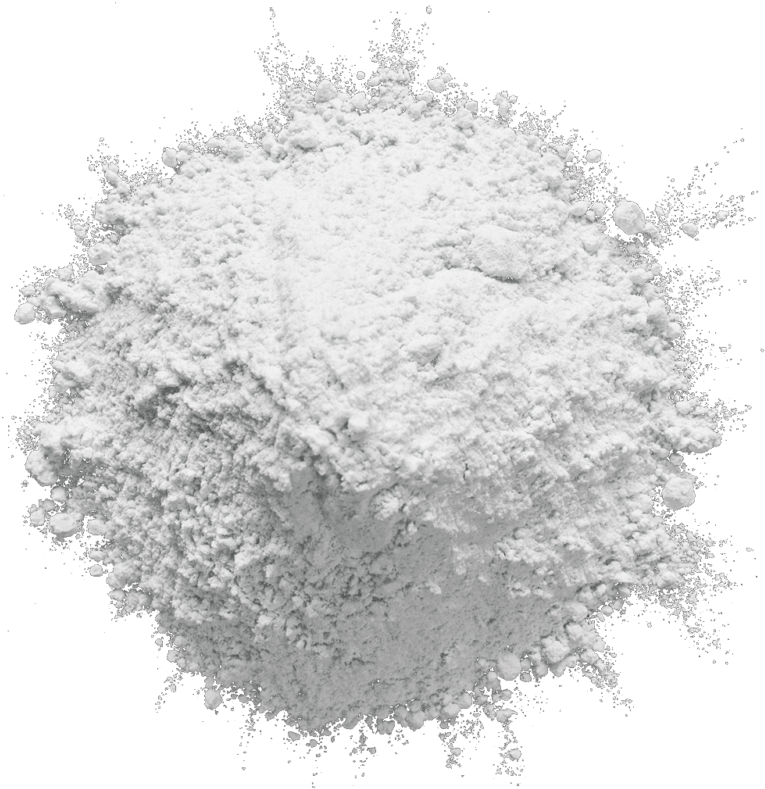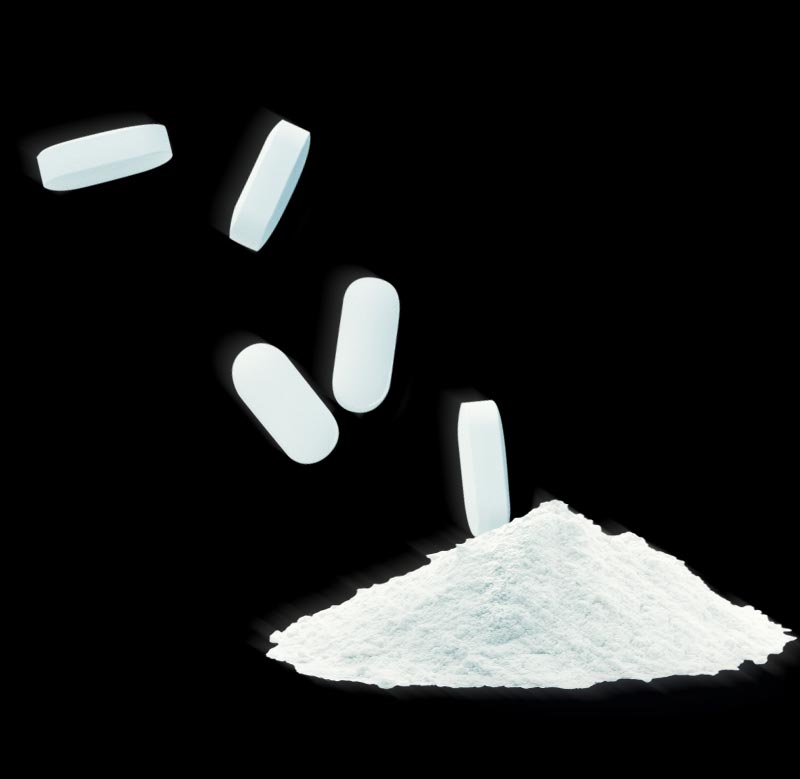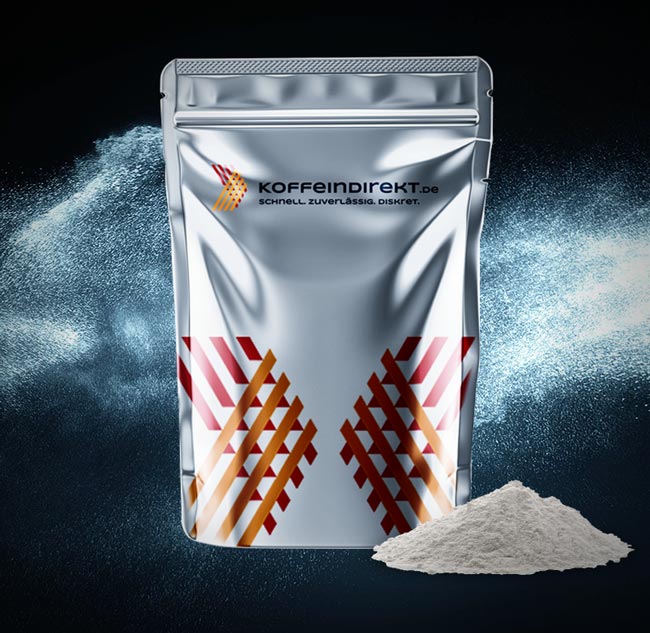
Caffeine: effects, dosage & possible applications

When talking about caffeine, many people immediately think of one thing: coffee. The popular pick-me-up is part of the morning ritual of millions of people worldwide. But coffee is only one of many ways to consume caffeine. The nerve and circulation-stimulating substance can be consumed in various ways: whether as chocolate or in liquid form, e.g. as tea, energy drink or fitness shake.
But what effect does caffeine have on the body? How long does it last? What is the maximum amount of caffeine per day? We answer these and other questions in our guide at KoffeinDirekt.de - Get all the relevant information about the duration of the effect, the caffeine content of foods, and the positive and negative properties of caffeine.
Caffeine: Effect on the body
Caffeine works by stimulating the release of the stress hormones cortisol and adrenaline. Caffeine increases blood pressure and makes the heart beat faster - the desired effect is achieved: The caffeine makes you awake. But how long does it take for caffeine to take effect? In order for caffeine to develop its invigorating effect, it must first enter the bloodstream. Depending on the person, this can take around 15 to 30 minutes. However, not only the duration of the effect but also the strength of the effect itself varies from person to person. This depends, for example, on whether someone consumes caffeine regularly or only occasionally. As with many stimulating substances, the body gets used to the active ingredient over time - so anyone who regularly consumes caffeine will find the waking effect less strong in the long term. In addition to the frequency of intake, other factors also play a role, e.g. metabolism. It determines how sensitive we are to caffeine and how quickly or slowly our body breaks down the stimulant.
How quickly is caffeine broken down in the body? It takes an average of four hours for the body to break down caffeine and excrete it through the urine. For groups of people with a slower caffeine breakdown, such as pregnant women, the half-life can increase to up to 20 hours.
Side effects of caffeine
The side effects of caffeine, are extremely diverse.
For example, the intake of too much caffeine can cause severe migraine and headache attacks. Caffeine consumption can also lead to a loss of fine motor skills. With regular caffeine consumption, however, these side effects occur rather rarely, since the habituation effect has already occurred.
Withdrawal symptoms with caffeine addiction
People who consume caffeine in high doses over a long period of time can become addicted to caffeine. One speaks of a caffeine addiction when withdrawal symptoms occur when the consumption of caffeine is restricted. Here you can find out more about the topic: caffeine addiction or caffeine withdrawal
Further side effects
- increased urge to urinate
- Incontinence (men)
- stomach complaints
- Problems falling asleep, insomnia
- inner restlessness up to states of fear
- Weld outbreaks
- Heart rhythm disturbances
- Nervousness
- Irritability
These symptoms are possible from a dose of 5.3 mg/kg body weight caffeine. However, this is not yet an overdose.
Caffeine Dosage & Overdose
The safe consumption quantity for healthy adults is up to 200 milligrams (i.e. about 3 mg/kg body weight) for single doses and up to 400 milligrams (5.7 mg/kg body weight) for daily rations.
For comparison: a cup of coffee (200 ml) contains around 90 milligrams of caffeine.
Caution with children and sick people: People who suffer from cardiovascular diseases as well as children should avoid caffeine if possible. The intake of caffeine in combination with certain medications (e.g. thyroid medication) should also be kept to a minimum or should be avoided altogether. Non-compliance increases the risk of cardiovascular problems.
For children and adolescents, the limit values for tea, cocoa and chocolate are as follows, depending on age:
3-10 years: up to 0.2 milligrams per kilogram body weight and day.
10-18 years: up to 1.4 milligrams per kilogram body weight and day.
Pregnant women should also pay attention to their caffeine intake, because caffeine can affect the growth of the unborn child. According to the European Food Safety Authority, expectant mothers are therefore advised not to drink more than 200 milligrams (about two cups of coffee) per day.
Athletes should also handle the substance responsibly - especially during the stress phase. If two milligrams or more of caffeine per kilogram of body weight are consumed during competition or training, there is a risk of side effects such as dizziness or palpitations.
Personengruppe | Dosierung |
|---|---|
Healthy Adults | up to 400 milligrams / day
(5.7 mg/kg body weight) |
Children 3-10 years: | up to 0.2 milligrams per kilogram body weight and day. |
Children 10-18 years: | up to 1.4 milligrams per kilogram body weight and day. |
Pregnant women | up to 200 milligrams / day |
Sportsmen / Athletes | one to two milligrams of caffeine per kilogram body weight / per training |
Overdosing:
One speaks of a caffeine overdose from an amount of one gram of caffeine. Such a dose can result in a highly accelerated pulse and extrasystoles (heartbeats outside the normal rhythm). Restlessness and insomnia may also occur. Some people may also experience anxiety due to excessive caffeine consumption. In the worst case, an overdose of caffeine can lead to circulatory collapse.
Caffeine content of coffee & other foods
How much caffeine is actually in our food? Energy drinks and coffee are widely known for their high caffeine content. But they are by far not the only foods with this characteristic.
The stimulating substance is also contained in black tea or even dark chocolate.
The Food and Drug Administration (FDA), an agency of the U.S. Department of Health and Human Services, has published a report on which foods are particularly rich in caffeine.
Note: The caffeine content of some foods may vary depending on how they are prepared. If, for example, a bag of black tea is steeped in hot water for about one minute, there is less caffeine in the cup than if it is steeped for a longer time.
Foods / Beverages | Caffeine content |
|---|---|
Espresso | 110 mg per 100 ml |
Dark chocolate | 88 mg per g |
Black Tea | 40 mg per 100 ml |
Schwarztee | 20 mg per 100 ml |
Energy Drinks | 30 mg per 100 ml |
Fitz Cola / Afri Cola | 25 mg per 100 ml |
Club Mate | 20 mg per 100 ml |
Caffeine pills vs. caffeine powder

Supplements such as powdered caffeine or caffeine tablets are enjoying growing popularity. Their easy intake and rapid action ensure that more and more people are discovering the waking food supplements for themselves. Especially for athletes and people with increased energy requirements, capsules and powders are a welcome alternative to classic foods such as coffee or energy drinks.
Caffeine powder and caffeine tablets differ essentially only in the way they are taken. While caffeine capsules (or tablets) are taken with a drink like ordinary pills, the powder can be dissolved in a liquid of your choice. The advantage of caffeine powder over caffeine tablets: The powder can be dosed individually and the amount of caffeine added can be better adjusted to your personal needs.
Where to buy Caffeine?
KoffeinDirekt is your reliable partner for high-quality caffeine in powder form. Our 100% pure caffeine powder in pharmaceutical quality is available in 9 different packaging sizes (bulk quantities available on request). We are characterized by easy payment and fast shipping. For orders within Germany we ship your goods the same day. Buying powdered caffeine is a matter of trust: all our products have been analyzed and certified in our laboratory. Convince yourself - we are looking forward to your order!
